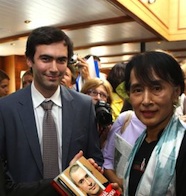Newsletter July 2012

Aung San Suu Kyi tells Khodorkovsky: “Don’t give up your fight”


Pavel Khodorkovsky, the eldest son of Mikhail Khodorkovsky, met with Burmese opposition leader and Nobel Peace Prize winner Aung San Suu Kyi in Paris at an event in June hosted by the French Ministry of Foreign Affairs. Suu Kyi, who after being placed under house arrest more than two decades ago became an international symbol of courage in the face of injustice, asked Pavel to pass along a personal message to his father: “Don’t give up your fight,” she said. “You must not let go of your principles.” During the meeting, Pavel delivered a private letter from his father and the two discussed how she and Mikhail could begin a sustained correspondence. In addition, Pavel presented Suu Kyi with copies of his father’s most recent books about life in the Russian penal system and his hopes for Russia’s future.

Khodorkovsky turns forty-nine
On June 26th Khodorkovsky turned forty-nine, his ninth birthday behind bars, meaning he has been imprisoned for nearly a fifth of his life. The administration of the Karelian town Segezha, where Khodorkovsky is imprisoned, authorised a picket for supporters to be held on his birthday. In Moscow a group of over fifty supporters lined up at the Central Post Office in Moscow to send a telegram to Khodorkovsky. Supporters sent numerous messages of support to Khodorkovsky via the new campaign website, and a number of opposition leaders and other public figures in Russia sent their birthday wishes via video, collectively urging that Khodorkovsky be freed by his next birthday.

Pavel Khodorkovsky meets Council of Europe officials and parliamentarians in Strasbourg
On his father’s birthday, Pavel Khodorkovsky was in Strasbourg discussing his father’s case with Council of Europe officials and parliamentarians. He met with Jean-Claude Mignon of France, President of the Parliamentary Assembly of the Council of Europe (PACE), and parliamentarians from several countries, including Estonia, Germany, Ireland, Italy, Luxembourg, the Netherlands, Norway, Romania and Switzerland. Amongst those met were György Frunda (Romania) and Andreas Gross (Switzerland), PACE rapporteurs on Russia. Pavel also discussed his father’s case with Thorbjørn Jagland, Secretary-General of the Council of Europe, and other officials.

Khodorkovsky calls on Supreme Court Chair to overturn military judge’s ruling
In a decision dated May 15th 2012, the Russian Supreme Court rejected a joint Khodorkovsky-Lebedev appeal against the second conviction and the 13-year prison sentence handed down in December 2010. The decision, signed by Judge Alexander Voronov of the Court’s Military Chamber, failed to provide valid reasoning against the complaints lodged, and instead simply summarised and reasserted and findings of the previous instances.
On June 7th 2012, in an open letter addressed to Vyacheslav Lebedev, Chair of the Russian Supreme Court for over 20 years, Khodorkovsky called for the “unprofessional” ruling by Judge Alexander Voronov to be overturned. “I am appealing to you because the ‘Yukos case’ has acquired a symbolic meaning for millions of entrepreneurs, executives and all the educated and concerned citizens of Russia. Many people all over the world follow decisions in this case,” Khodorkovsky wrote.

Father’s Day messages from Pavel and Anastasia Khodorkovsky
In June both Pavel and his sister Anastasia spoke out about the dreams they have of being reunited with their father. Writing in the Philadelphia Inquirer, Pavel recalled his last conversation with his father in 2003, a month before his arrest: “We talked about each other’s goals and dreams — me, to finish school and set off in business; him, to leave the business world at age 45 (he was 40 at the time) and dedicate himself to building civil society in Russia. During one of our last face-to-face conversations I asked if he was fearful of returning home…He said he was prepared for a possible arrest and that he would fight for justice. Though he has hardly gotten a fair chance, facing a rigged Russian judicial system at every turn, he hasn’t given up fighting for a more just Russia, even after nearly a decade away from society. In that time, he has been painted as an unnecessarily sanguine prisoner, a capitalist and a dissident. But I am most proud to call him my father.”
In an interview with TV Rain, Anastasia said she does not remember the day of her father’s arrest; she can only remember the raw emotional impact. She was too young to be allowed into the court during the first trial; all she could do was grab his hand for a few short seconds before she was thrown out of the chamber. She stated: “I feel hurt that my father is in this situation which he cannot get out of. My brothers and I are growing up, studying. It is hard that our lives are progressing and at the same time, our father is not with us. It is very hard, but I understand that he did what he did because of his own priorities, not for nothing…I dream about reunited family — about my father’s return. I dream about creating my own family and hope for good relations between everyone.”

In His Own Words
In Khodorkovsky’s third lecture, published in Novaya Gazeta in June, he shared his views on the relationship between liberal and nationalist ideologies in Russia today. Khodorkovsky stated his belief that the Russian state has “gotten stuck at a historical backwater railway station lost between empire and nation-state, and is not only not going forward, but at times is even starting to move in reverse”; and he concludes that “a nation cannot be reduced to an ethnos, but neither can it be regarded in isolation from a thoroughly specific cultural community.”
Also in June, in Fontanka Khodorkovsky outlined his views on the Russian penal system, and his thoughts on the reforms needed to improve rehabilitation and reduce repeat offenders.



